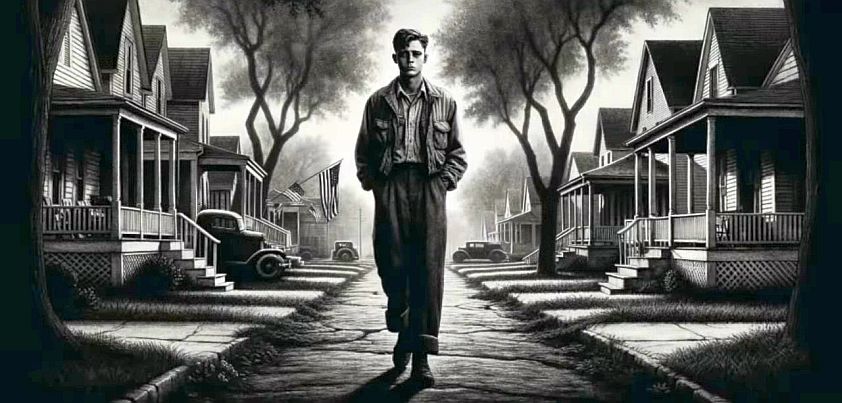 This story by Ernest Hemingway about an American soldier’s difficulty “fitting in” after returning from World War 1 is a wonderful example of the author’s Iceberg Theory, with much of the protagonist’s background hidden from readers. Upon return, the soldier finds himself alienated from his culture, community, friends, and family. He falls into depression and lethargy, obsessed with watching local girls go by, but avoiding contact with them. This may be due to an earlier failed relationship, or his distaste for his pious, controlling mother. Themes include PTSD, alienation, cultural and social change, fear of involvement and commitment. More…
This story by Ernest Hemingway about an American soldier’s difficulty “fitting in” after returning from World War 1 is a wonderful example of the author’s Iceberg Theory, with much of the protagonist’s background hidden from readers. Upon return, the soldier finds himself alienated from his culture, community, friends, and family. He falls into depression and lethargy, obsessed with watching local girls go by, but avoiding contact with them. This may be due to an earlier failed relationship, or his distaste for his pious, controlling mother. Themes include PTSD, alienation, cultural and social change, fear of involvement and commitment. More…
Archives
Wakefield
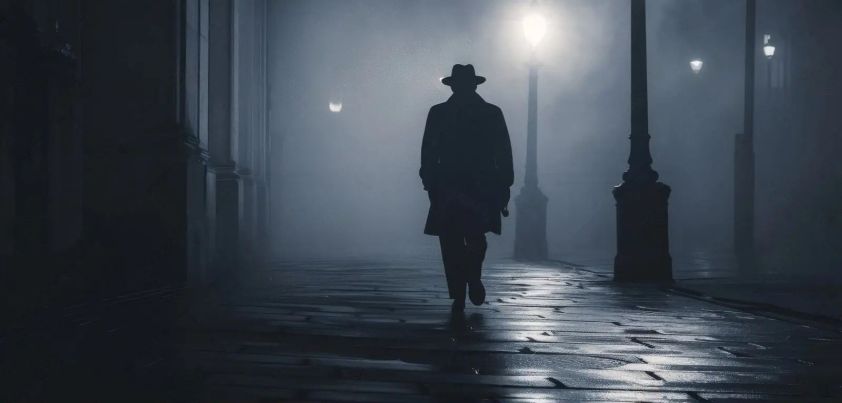 This Nathaniel Hawthorne story opens with a newspaper account of a man who ‘disappeared’ after telling his wife he was going on a week’s holiday, stalked her for twenty years, and then returned home as if nothing had happened. The narrator speculates that the man’s ‘holiday’ may have been a cruel joke to see how his wife would cope without him, and that he gradually became so enamoured with the isolated, clandestine existence that he found it difficult to return home to his former life. Themes include singularity, alienation and isolation, resilience (the wife’s life goes on), obsession, insignificance. More…
This Nathaniel Hawthorne story opens with a newspaper account of a man who ‘disappeared’ after telling his wife he was going on a week’s holiday, stalked her for twenty years, and then returned home as if nothing had happened. The narrator speculates that the man’s ‘holiday’ may have been a cruel joke to see how his wife would cope without him, and that he gradually became so enamoured with the isolated, clandestine existence that he found it difficult to return home to his former life. Themes include singularity, alienation and isolation, resilience (the wife’s life goes on), obsession, insignificance. More…
The Fat Girl
 This story from Andre Dubus highlights the psychological damage that can arise when young people are shamed for not fitting community or cultural norms. A mother’s efforts to control her daughter’s diet results in a serious eating disorder. Later, a weight-loss program initiated by a well-meaning college roommate leads to a confused self-image, an unfulfilling, shallow marriage and, when she becomes pregnant, recurrence of the eating disorder. Fortunately, the birth of a son brings about an epiphany through which she is finally able to be comfortable with who she is. Themes: conformity, identity, food and dieting, body shaming, friendship, transformation. More…
This story from Andre Dubus highlights the psychological damage that can arise when young people are shamed for not fitting community or cultural norms. A mother’s efforts to control her daughter’s diet results in a serious eating disorder. Later, a weight-loss program initiated by a well-meaning college roommate leads to a confused self-image, an unfulfilling, shallow marriage and, when she becomes pregnant, recurrence of the eating disorder. Fortunately, the birth of a son brings about an epiphany through which she is finally able to be comfortable with who she is. Themes: conformity, identity, food and dieting, body shaming, friendship, transformation. More…
In the Region of Ice
 In this story by Joyce Carol Oates, a young nun teaching her first semester at a Jesuit university is confident in her academic role but feels confused and alienated by the outside world. Things change when a brilliant but mentally disturbed Jewish graduate student joins her literature class. Although stimulated by his questions and probing mind, he exhibits a need for emotional support beyond her comfort zone. When she refuses a request to lend him money and take his hand, he becomes hysterical and verbally abusive. Themes include identity, connection (emotional detachment), mental illness, alienation, faith, compassion. More…
In this story by Joyce Carol Oates, a young nun teaching her first semester at a Jesuit university is confident in her academic role but feels confused and alienated by the outside world. Things change when a brilliant but mentally disturbed Jewish graduate student joins her literature class. Although stimulated by his questions and probing mind, he exhibits a need for emotional support beyond her comfort zone. When she refuses a request to lend him money and take his hand, he becomes hysterical and verbally abusive. Themes include identity, connection (emotional detachment), mental illness, alienation, faith, compassion. More…
The Cask of Amontillado
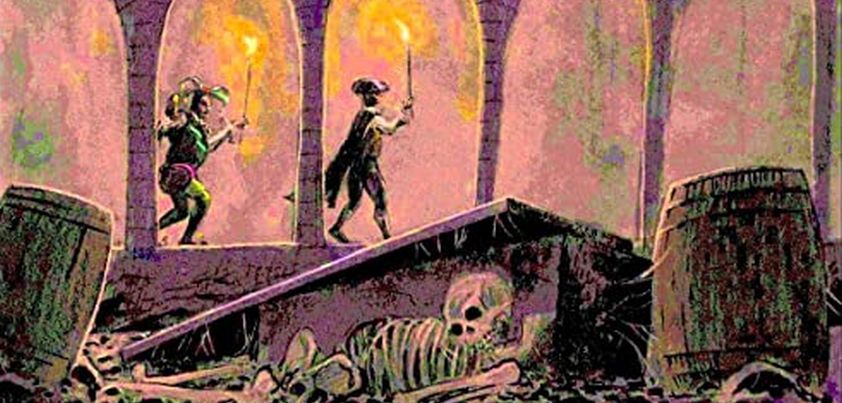 There is not much one can add to what has already been written about this classic tale from Edgar Allan Poe. Widely regarded as one of the world’s greatest Gothic horror stories, it is yet another example of Poe’s ability to supplement situational horror with insights into the twisted minds of his protagonists. The horror aspect of this story about a wine-tasting gone wrong (or right, depending on how you look at it) is enhanced by the ambiguity about the seriousness of the “insult” that lead to the victim’s claustrophobic end. Themes: revenge, trust/deceit, pride, envy, mortality, confession. More…
There is not much one can add to what has already been written about this classic tale from Edgar Allan Poe. Widely regarded as one of the world’s greatest Gothic horror stories, it is yet another example of Poe’s ability to supplement situational horror with insights into the twisted minds of his protagonists. The horror aspect of this story about a wine-tasting gone wrong (or right, depending on how you look at it) is enhanced by the ambiguity about the seriousness of the “insult” that lead to the victim’s claustrophobic end. Themes: revenge, trust/deceit, pride, envy, mortality, confession. More…
Silver Water
 Amy Bloom’s deeply moving Silver Water examines an often-overlooked aspect of mental illness: its impact on the sufferer’s family. Throughout the story, the parents (Galen and David) and their two “warrior queen” daughters struggle to navigate their way through inadequate medical insurance and mental illness support systems. In the process, they demonstrate what family love is all about. There is considerable irony in the fact that David (a psychiatrist!) not only failed to diagnose his daughter’s condition, but also has the most difficulty coping with her at home. Themes: mental illness, family love, death as a relief. More…
Amy Bloom’s deeply moving Silver Water examines an often-overlooked aspect of mental illness: its impact on the sufferer’s family. Throughout the story, the parents (Galen and David) and their two “warrior queen” daughters struggle to navigate their way through inadequate medical insurance and mental illness support systems. In the process, they demonstrate what family love is all about. There is considerable irony in the fact that David (a psychiatrist!) not only failed to diagnose his daughter’s condition, but also has the most difficulty coping with her at home. Themes: mental illness, family love, death as a relief. More…
The Oval Portrait
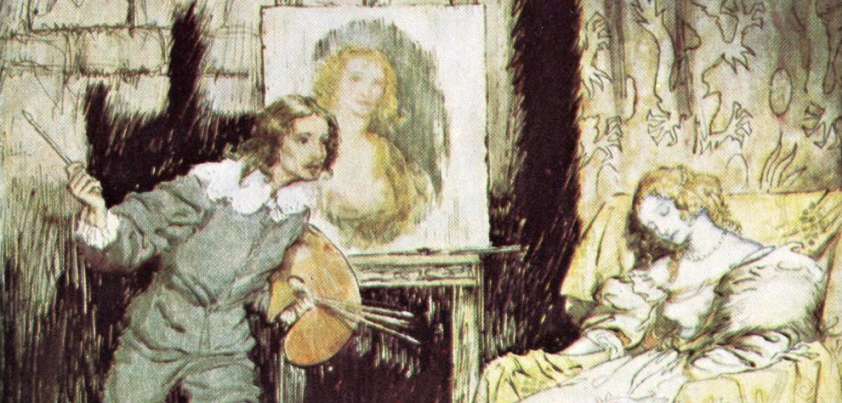 This Edgar Allan Poe story demonstrates the sinister side of how beauty can live on through art. An injured traveler takes shelter in an empty mountain chateau. There are paintings on and around the walls of his room. On his pillow is a book describing them. His eyes fall on the portrait of a beautiful woman that seems a little too lifelike. Disturbed, he finds its entry in the book. The woman’s story suggests that although art can preserve beauty, artistic obsession can destroy it in the making. Themes include art and artistry, rare beauty, love, obedience, obsession and death. More…
This Edgar Allan Poe story demonstrates the sinister side of how beauty can live on through art. An injured traveler takes shelter in an empty mountain chateau. There are paintings on and around the walls of his room. On his pillow is a book describing them. His eyes fall on the portrait of a beautiful woman that seems a little too lifelike. Disturbed, he finds its entry in the book. The woman’s story suggests that although art can preserve beauty, artistic obsession can destroy it in the making. Themes include art and artistry, rare beauty, love, obedience, obsession and death. More…
Small Change
 This impressionistic novella by Yehudit Hendel describes the psychological trauma experienced by an Israeli woman while imprisoned for a minor crime in post-World War 2 Switzerland. After growing up in an oppressive atmosphere dominated by a cold, autocratic father, her nightmarish ordeal is an allusion to Germany’s inhuman treatment of detainees during the holocaust. Although severely impacted by the experience, she is empowered to rebel against her cruel, obsessive father, who has cared more about his stamp and small change collections than his family. Themes: parent-child relationships, obsession, anti-Semitism, injustice, cruelty and sexual violence, self-empowerment. More…
This impressionistic novella by Yehudit Hendel describes the psychological trauma experienced by an Israeli woman while imprisoned for a minor crime in post-World War 2 Switzerland. After growing up in an oppressive atmosphere dominated by a cold, autocratic father, her nightmarish ordeal is an allusion to Germany’s inhuman treatment of detainees during the holocaust. Although severely impacted by the experience, she is empowered to rebel against her cruel, obsessive father, who has cared more about his stamp and small change collections than his family. Themes: parent-child relationships, obsession, anti-Semitism, injustice, cruelty and sexual violence, self-empowerment. More…
Camp Cataract
 This story from Jane Bowles examines the toxic relationship between three troubled sisters who share a city apartment. One of them is midway through a ten-week holiday in a Camp Cataract cabin as part of a long-term plan to move out and live independently. When another turns up uninvited, hoping to convince her to cut the holiday short, they arrange to meet for lunch the next day. Both have different recollections of what happens the following morning. Madness intervenes, and only one of them survives the day. Themes: self-analysis, identity, independence, mental illness, spinsterhood, female relationships. More…
This story from Jane Bowles examines the toxic relationship between three troubled sisters who share a city apartment. One of them is midway through a ten-week holiday in a Camp Cataract cabin as part of a long-term plan to move out and live independently. When another turns up uninvited, hoping to convince her to cut the holiday short, they arrange to meet for lunch the next day. Both have different recollections of what happens the following morning. Madness intervenes, and only one of them survives the day. Themes: self-analysis, identity, independence, mental illness, spinsterhood, female relationships. More…
The Imp of the Perverse
 Like two of our earlier Edgar Allan Poe tales (The Back Cat and The Tell-Tale Heart), this story involves an unreliable, unhinged narrator facing execution for murder trying to account for his crime. He blames his actions on an agent he claims to be in all of us called the “Imp of the Perverse”. The Imp, he argues, is an urge that drives people to do things they shouldn’t for the simple reason that they know it to be wrong. Ironically, the Imp that drove him to murder also drove him to confess. Themes include perverseness, obsession, madness, self-destruction. More…
Like two of our earlier Edgar Allan Poe tales (The Back Cat and The Tell-Tale Heart), this story involves an unreliable, unhinged narrator facing execution for murder trying to account for his crime. He blames his actions on an agent he claims to be in all of us called the “Imp of the Perverse”. The Imp, he argues, is an urge that drives people to do things they shouldn’t for the simple reason that they know it to be wrong. Ironically, the Imp that drove him to murder also drove him to confess. Themes include perverseness, obsession, madness, self-destruction. More…
Death in Venice
 This Thomas Mann classic is renowned for its masterful psychological profile of Aschenbach, a jaded, aging writer who develops an unhealthy infatuation with a fourteen-year-old-boy during a Venetian holiday. Although the novella’s central theme (homosexuality) is no longer controversial, other aspects of the story (pedophilia and stalking) certainly are. Sympathy for Aschenbach is greatly diminished when, out of selfishness, he decides not to warn the holidaying boy’s family about a deadly epidemic being covered up by authorities. Many readers see Aschenbach’s fate as just punishment for his actions. Other themes: art and the artist, alienation, obsession, depravity, death. More…
This Thomas Mann classic is renowned for its masterful psychological profile of Aschenbach, a jaded, aging writer who develops an unhealthy infatuation with a fourteen-year-old-boy during a Venetian holiday. Although the novella’s central theme (homosexuality) is no longer controversial, other aspects of the story (pedophilia and stalking) certainly are. Sympathy for Aschenbach is greatly diminished when, out of selfishness, he decides not to warn the holidaying boy’s family about a deadly epidemic being covered up by authorities. Many readers see Aschenbach’s fate as just punishment for his actions. Other themes: art and the artist, alienation, obsession, depravity, death. More…
The End of the Party
 Although the 9-year-old twins in this Graham Greene story look the same, they have very different psychological dispositions. The first-born (Peter) is self-confident and has a special connection with his brother. The younger (Francis) has an anxiety disorder that results in unreasoning fear, particularly of the dark. Peter feels what Francis feels, and is fiercely protective of him. Despite their best efforts to avoid it, the two attend a birthday party that will include a game of hide-and-seek in the dark. During the game, a thoughtless act by Peter has tragic results. Themes: innocence, brotherhood, connection, fear, adult insensitivity, death. More…
Although the 9-year-old twins in this Graham Greene story look the same, they have very different psychological dispositions. The first-born (Peter) is self-confident and has a special connection with his brother. The younger (Francis) has an anxiety disorder that results in unreasoning fear, particularly of the dark. Peter feels what Francis feels, and is fiercely protective of him. Despite their best efforts to avoid it, the two attend a birthday party that will include a game of hide-and-seek in the dark. During the game, a thoughtless act by Peter has tragic results. Themes: innocence, brotherhood, connection, fear, adult insensitivity, death. More…
The Tell-Tale Heart
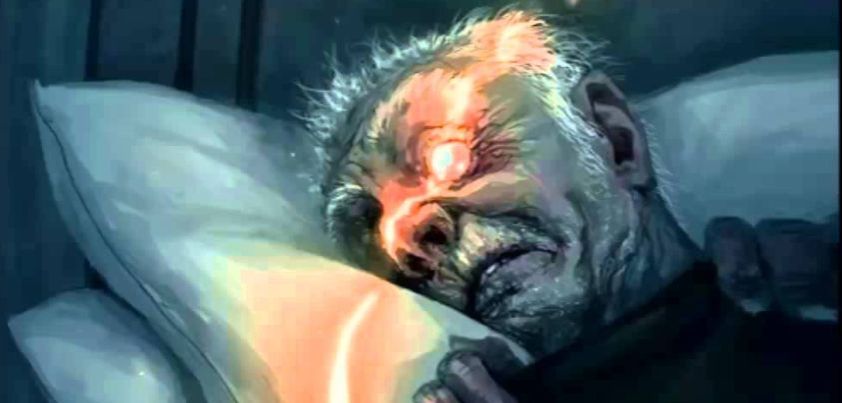 In this Gothic horror story by Edgar Allan Poe, the narrator describes how cleverly he or she has planned and carried out the murder of an old man. The only reason given is fear of what is described as the old man’s ‘vulture eye’. The narrator’s purpose in telling the story is to convince the audience that he or she is not mad. There are a number of ironic aspects to the story, perhaps the greatest being that in trying to prove his or her sanity, the narrator clearly demonstrates the opposite. Themes: mental illness, fear, time, guilt vs. innocence. More…
In this Gothic horror story by Edgar Allan Poe, the narrator describes how cleverly he or she has planned and carried out the murder of an old man. The only reason given is fear of what is described as the old man’s ‘vulture eye’. The narrator’s purpose in telling the story is to convince the audience that he or she is not mad. There are a number of ironic aspects to the story, perhaps the greatest being that in trying to prove his or her sanity, the narrator clearly demonstrates the opposite. Themes: mental illness, fear, time, guilt vs. innocence. More…
The Beast in the Jungle
 Despite a relatively simple plot and only two main characters, this short novella by Henry James can be hard-going on the first read. A man is obsessed with the feeling that misfortune of some kind will come into his life “like a beast in the jungle”. He shares the premonition with a female acquaintance, who is interested enough to agree to stay close and “watch his back”. In order to build suspense in the lead-up to the story’s heartbreaking conclusion, James shrouds the interactions between the two in confusion and ambiguity. Themes: fate, obsession, connection, insensitivity, suffering, death, guilt. More…
Despite a relatively simple plot and only two main characters, this short novella by Henry James can be hard-going on the first read. A man is obsessed with the feeling that misfortune of some kind will come into his life “like a beast in the jungle”. He shares the premonition with a female acquaintance, who is interested enough to agree to stay close and “watch his back”. In order to build suspense in the lead-up to the story’s heartbreaking conclusion, James shrouds the interactions between the two in confusion and ambiguity. Themes: fate, obsession, connection, insensitivity, suffering, death, guilt. More…
An Outpost of Progress
 Joseph Conrad’s major theme in this story is the hypocrisy of colonialism. Motivated by greed, the bumbling administrators of a remote African trading post rationalize their activities by talking about the sacredness of the civilizing work, and the merits of those who (go) about bringing light, and faith and commerce to the dark places of the earth. They denigrate the local tribesmen, but make no effort to learn their language or customs. Ironically, being cut off from civilization results in their moral, physical and mental decline to an even lower level of savagery. Themes: colonialism, greed, slavery, isolation, madness. More…
Joseph Conrad’s major theme in this story is the hypocrisy of colonialism. Motivated by greed, the bumbling administrators of a remote African trading post rationalize their activities by talking about the sacredness of the civilizing work, and the merits of those who (go) about bringing light, and faith and commerce to the dark places of the earth. They denigrate the local tribesmen, but make no effort to learn their language or customs. Ironically, being cut off from civilization results in their moral, physical and mental decline to an even lower level of savagery. Themes: colonialism, greed, slavery, isolation, madness. More…
Old Man at the Bridge
 Although a war story, the major theme of this vignette by Ernest Hemingway is not the physical horrors of armed conflict, but rather the psychological impact on the lives of those caught up in its wake. An old man has dedicated his life to caring for several pets. Forced to set them free and flee, he now fears for their safety and sits alone on a bridge, having lost the drive to go on. The narrator, a soldier focused on this duty, reluctantly leaves him to his fate. Other themes include alienation, anxiety, guilt and despair, resignation, duty vs. compassion. More…
Although a war story, the major theme of this vignette by Ernest Hemingway is not the physical horrors of armed conflict, but rather the psychological impact on the lives of those caught up in its wake. An old man has dedicated his life to caring for several pets. Forced to set them free and flee, he now fears for their safety and sits alone on a bridge, having lost the drive to go on. The narrator, a soldier focused on this duty, reluctantly leaves him to his fate. Other themes include alienation, anxiety, guilt and despair, resignation, duty vs. compassion. More…
Diary of a Madman
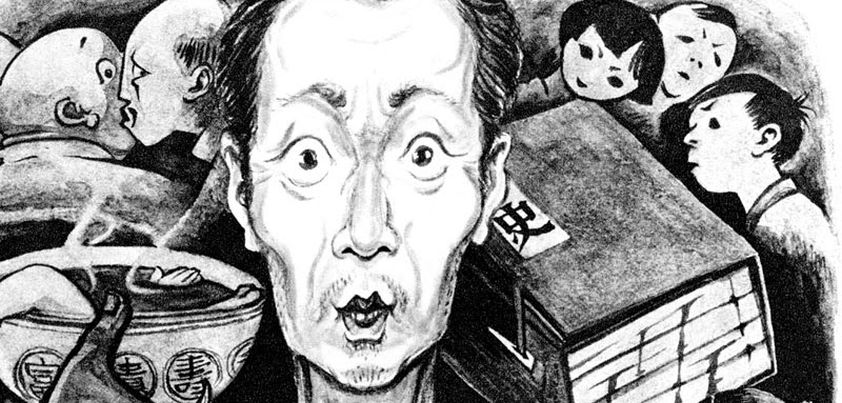 Lu Xun‘s diarist suffers from paranoia, stemming from strange looks he thinks he is getting from fellow villagers. On learning of an act of ritual cannibalism in a neighboring village, he concludes that those around him, including his own brother, are planning to make a meal of him. The story has several interpretations. The most common is that it satirizes the outdated Confucian traditions of Chinese feudal society. An opposing view is that it cautions the May Fourth period’s New Culture Movement against indiscriminately overturning (eating) all past traditions. Themes: madness, cannibalism, tradition, betrayal. More…
Lu Xun‘s diarist suffers from paranoia, stemming from strange looks he thinks he is getting from fellow villagers. On learning of an act of ritual cannibalism in a neighboring village, he concludes that those around him, including his own brother, are planning to make a meal of him. The story has several interpretations. The most common is that it satirizes the outdated Confucian traditions of Chinese feudal society. An opposing view is that it cautions the May Fourth period’s New Culture Movement against indiscriminately overturning (eating) all past traditions. Themes: madness, cannibalism, tradition, betrayal. More…
Notes to My Biographer
 The narrator of this dark comedy by Adam Haslett is a mentally ill seventy-three-year-old. The proud, delusional man won’t acknowledge the problem, refuses to take his medication, and is in severe financial difficulty. After a road trip to visit his son Graham, the only family member who will see him, he comes up with an idea for a revolutionary new bicycle that will make both of them rich. Graham, who is secretly battling the same illness as his father, is left shattered by the visit. Themes include mental illness, pride, estrangement, loneliness, obsession, paranoia, sexuality, embarrassment, fear. More…
The narrator of this dark comedy by Adam Haslett is a mentally ill seventy-three-year-old. The proud, delusional man won’t acknowledge the problem, refuses to take his medication, and is in severe financial difficulty. After a road trip to visit his son Graham, the only family member who will see him, he comes up with an idea for a revolutionary new bicycle that will make both of them rich. Graham, who is secretly battling the same illness as his father, is left shattered by the visit. Themes include mental illness, pride, estrangement, loneliness, obsession, paranoia, sexuality, embarrassment, fear. More…
The Willow Walk
 In this story by Sinclair Lewis, twins Jasper and John Holt couldn’t be more different: Jasper, a well-dressed, respectable bank teller and admired member of a community theatre group; John, a disheveled, reclusive religious fanatic and admired member of an obscure religious cult. Yet they are the same person, a skilled actor carrying out an elaborate bank heist. The robbery goes off perfectly… “Jasper” mysteriously disappears, and John, who no one suspects, has the money. All goes well until John’s conscience causes him to descend into madness. Themes include crime, dissimulation, social class, religious zealotry, guilt, madness, atonement, despair. More…
In this story by Sinclair Lewis, twins Jasper and John Holt couldn’t be more different: Jasper, a well-dressed, respectable bank teller and admired member of a community theatre group; John, a disheveled, reclusive religious fanatic and admired member of an obscure religious cult. Yet they are the same person, a skilled actor carrying out an elaborate bank heist. The robbery goes off perfectly… “Jasper” mysteriously disappears, and John, who no one suspects, has the money. All goes well until John’s conscience causes him to descend into madness. Themes include crime, dissimulation, social class, religious zealotry, guilt, madness, atonement, despair. More…
The Black Cat
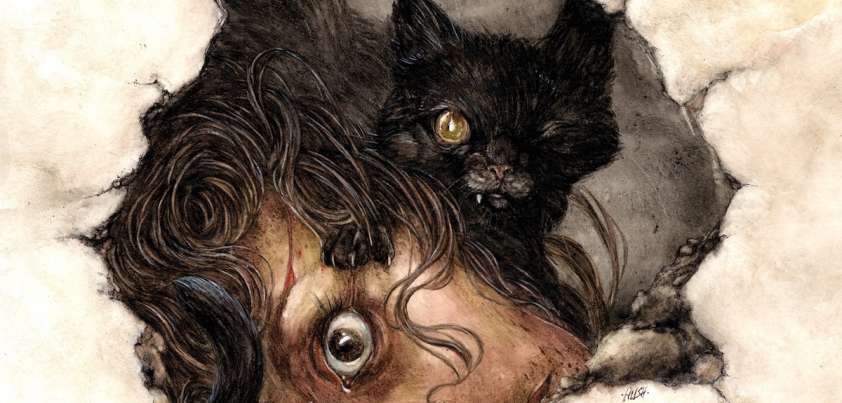 The Stephen Kings of the writing world tend to use external, often supernatural forces as their instruments of terror. With Edgar Allan Poe, the horror generally develops from the tortured mind of man. The protagonist here has lost his mind to alcoholism. Like many alcoholics, he becomes violent when in a drunken state. This is initially directed towards family pets. Extreme cruelty to animals can indicate psychopathic tendencies, and this proves true later in the story when he shows no remorse for any of his actions, including the murder of his wife. Themes: alcoholism, mental illness, brutality, death. More…
The Stephen Kings of the writing world tend to use external, often supernatural forces as their instruments of terror. With Edgar Allan Poe, the horror generally develops from the tortured mind of man. The protagonist here has lost his mind to alcoholism. Like many alcoholics, he becomes violent when in a drunken state. This is initially directed towards family pets. Extreme cruelty to animals can indicate psychopathic tendencies, and this proves true later in the story when he shows no remorse for any of his actions, including the murder of his wife. Themes: alcoholism, mental illness, brutality, death. More…